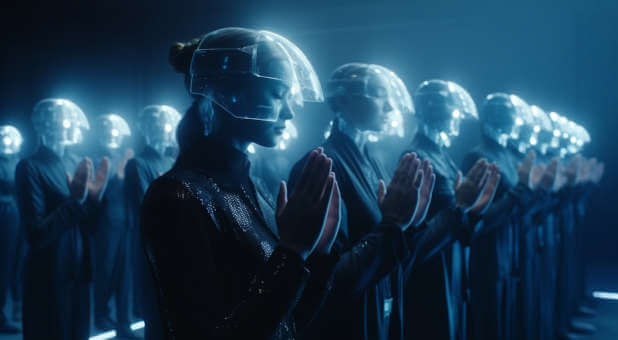Experts are warning that humans could soon be shifting their devotion from traditional religious beliefs to worship Artificial Intelligence as if it were a deity.
Lars Holmquist, a professor of design and innovation at Nottingham Trent University, highlights the psychological aspect of human-computer interactions, stating that people interpret AI responses, such as those from ChatGPT, as meaningful and akin to seeking guidance from religious scriptures.
“The results of generative AI are very open for interpretation, so people can read anything into them. Psychologists have historically proven that humans interpret their interactions with computers like real social relationships,” Holmquist says. “So it’s very possible that people are using AI to find meaning and guidance, much like from religious scriptures, even though there may be no actual meaning there. There have also been examples of people interpreting AI chatbots as being conscious—which they most definitely are not—which raises very interesting theological issues for those who believe humans are a unique creation.”
Breaking News. Spirit-Filled Stories. Subscribe to Charisma on YouTube now!
Holmquist notes the open interpretation of generative AI results, allowing individuals to find meaning and purpose in AI interactions. He raises intriguing theological questions for those who consider humans a unique creation, especially when some interpret AI chatbots as conscious beings. The emergence of robot priests and the transhumanist movement further blurs the lines between technology and spirituality, with some envisioning AI as God-like entities.
“I think at the moment the role for AI and robots is more as an aide to existing religious organizations and churches, much like commercial companies use AI to understand and communicate with customers. I have not heard of any worship of software entities yet, but I would not be surprised if it happens in the future,” continues Holmquist.
The transhumanist belief in AI resurrection and the desire for human-machine integration add complexity to the growing intersection of technology and faith. While some argue that AI models, like ChatGPT, may eventually be treated as living entities, others see them as tools supporting existing religious organizations.
False Gods and Idol Worship
The Bible strongly condemns the worship of false gods and idolatry. In Exodus 20:3-5, God commands, “You shall not make for yourself any graven idol, or any likeness of anything that is in heaven above, or that is in the earth beneath, or that is in the water below the earth. You shall not bow down to them or serve them; for I, the Lord your God, am a jealous God, visiting the iniquity of the fathers on the children to the third and fourth generation of them who hate Me.”
Throughout the Old and New Testaments, the Bible emphasizes the exclusive worship of the one true God and warns against turning to idols.
Christian Response to Growing Paganism
In light of the increasing inclination toward paganism and potential AI worship, Christians can turn to biblical principles for guidance. The Bible encourages us to stand firm in our faith and resist the temptation to worship anything other than the One, true God. Romans 12:2 advises, “Do not conform to the pattern of this world but be transformed by the renewing of your mind.”
As Christians, we should engage in meaningful dialogue with those exploring alternative beliefs, presenting the uniqueness of the Christian faith. Acts 17:22-23 provides an example when Paul addressed the Athenians who worshiped an “unknown god,” proclaiming the true identity of the God they sought.
Prayer, reliance on Scripture and living out the teachings of Jesus are essential for us as Christians to navigate the challenges of a changing spiritual landscape. As technology advances, maintaining a strong foundation in biblical truth becomes crucial to discern the spiritual implications of emerging trends around us.{eoa}
Join Charisma Magazine Online to follow everything the Holy Spirit is doing around the world!
James Lasher is Staff Writer for Charisma Media.














































